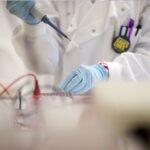The Cancer Research UK Manchester Centre funding and infrastructure provides an invaluable framework to support cancer research in Manchester beyond the direct research focus of the Centre. It provides an ecosystem to support and leverage other externally-funded infrastructure, networks and centres, some of which are detailed below.
The MCRC Biobank
The MCRC Biobank was created in 2007 and is funded through the Integrative Pathology theme of the CRUK Manchester Centre. The Biobank centralises and standardises the collection of human samples from cancer patients, allowing more efficient use of resources and easy access of samples for research. Through four NHS trusts, it collects tissue, blood and other samples from patients in Greater Manchester who are undergoing an operation or procedure for a confirmed or suspected diagnosis of cancer and to date has collected more than 150,000 samples.


Core Facilities at the CRUK Manchester Institute
The CRUK Manchester Centre supports several posts in the core facilities at the Cancer Research UK Manchester Institute to help provide access for researchers across the centre to access the various technological platforms.
At the Cancer Research UK Manchester Institute, Visualisation, Irradiation and Analysis, and Flow Cytometry facilities provide cutting-edge tools for both the fundamental and translational study of cancer, from molecular interactions in primary cells through to tissue-wide responses. Their equipment enables high content screening and super resolution microscopy as well as cell sorting and analysing, spectroscopy and both confocal and widefield microscopy. More recently a Helios platform has been added to allow a higher level of multiplex analysis to complement traditional FACS analysis.
Histology works with researchers to enable sectioning, staining and mounting of tissue samples. Unstained high-quality paraffin fixed or frozen sections are produced for immunohistochemical analysis, in situ hybridisation and laser capture microdissection, or alternatively the sections may be stained for morphological examination. Their various platforms enable the analysis of tissue, cells and CTCs, and much is fully automated to allow high throughput scanning and virtual microscopy. The most recent technology to be added is the Codex platform which, as with the Helios, push the boundaries of multiplexing to a much higher level.
Core facilities support a wide variety of molecular biology projects. Illumina instruments are used to support a range of sequencing applications with a particular focus on single cell techniques. Additionally, protein and peptide mass spectrometry requirements are supported by a biological mass spectrometry facility that offers an array of qualitative and quantitative analyses.
High Performance Computing (HPC) has become a pre-requisite for the proper exploitation of cancer genomics data as a consequence of the high volumes of data produced by recent advances in deep sequencing, imaging, and tandem mass spectrometry (MS/MS). The Institute’s Scientific Computing team supports translational cancer research and has the specific purpose of providing a state-of-the-art HPC service and data management service.
A full list of facilities available at the CRUK Manchester Institute can be found on the Institute’s Services and Technology webpages.

Radiotherapy Facilities at The Christie
The Christie is home to one of the largest radiotherapy departments in Europe as well as being one of only two centres worldwide that offer MR-Linac and proton beam therapy. The Christie currently houses ten linear accelerators in the Withington site, with two further accelerators at The Christie’s Salford site and another two at the Oldham site. The Christie also offers specialist linear accelerators for Stereotactic Ablative Body Radiotherapy (SABR), to treat lung, spine, liver, adrenal, lymph nodes and bone disease tumours.
The Proton Beam Therapy Centre, opened in 2018, offers three treatment gantries as well as a dedicated Research Room to investigate the cutting edge treatment.
The Withington site is also home to an MRI-guided radiotherapy system called the MR-linac enabling real-time imaging during treatment to more accurately deliver radiotherapy beam to tumours.

Manchester Experimental Cancer Medicine Centre
The Manchester Experimental Cancer Medicine Centre was established in 2007 and is leading the way in cancer research with an unwavering focus on offering the best treatment options to patients through precision medicine. The Manchester ECMC is part of the wider ECMC Network and also ‘ECMC North’ a network of six northern ECMCs designed to give patients better access to the broadest range of experimental cancer medicine clinical trials. The Manchester ECMC is both an Adult and Paediatric centre, with paediatric care being based at the Royal Manchester Children’s Hospital.
Its work takes into consideration the complex genetics and evolution of cancer and how this affects the way in which an individual responds to treatments. This is done through a renewed concentration on molecular profiling, biobanking, imaging, biomarker discovery and radiotherapy related research; as well as a focus on prevention and early detection.

Core Facilities at the University of Manchester
Our scientists have access to the various facilities on the Oxford Road main campus within the University of Manchester. All the facilities are staffed by skilled experimental officers and technicians to provide an efficient and effective means of delivering key technologies. A full list of core facilities is available on the Faculty of Biology Medicine and Health website.
Navigation
About the CRUK Manchester Centre
The CRUK Manchester Centre is a translational research centre dedicated to delivering precision medicine for all.
Collaborations
We cannot achieve our vision alone. That's why collaboration lies at the heart of the Centre.
About
Navigate back to the About homepage.



